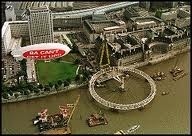Growing market share: top tips from Virgin Atlantic

The airline, which operates 38 craft and brings in $2bn in revenue, follows a three-pronged strategy to increasing its competitive share: customer service; product innovation; and cleaver advertising, explained marketing director Paul Dickinson.
“Our approach to achieving brand commitment from customers can be adopted by a related industry and adapted in their business to help steal market share from competitors,” he told hotel executives at the recent Master Innholders annual conference.
Customer service
The most important thing in a customer-facing business is to deliver to people what they are hoping you will deliver, he said. To do that, you need to create a positive culture in your company so that all new staff become part of that.
“The recruitment process is the first step in delivering the customer service you want to achieve. We invest time in selecting the very best out of the 60,000 applicants we get every year. And we always go for people who have the right personality, people who smile and who have a customer-oriented view of the world.”
The training process is also key, said Dickinson. Virgin staff follow a Brilliant Basics and a Magic Touches training course. The first aims to remind people how to get the basic things right, such as looking smart in uniform, or keeping the aircraft tidy. The second teaches them how to stand out to customers by doing things well and doing them with style, for example caring for the elderly or showing extra attention to a baby.
Overall, the six service keys transmitted in the firm’s training are:
- Inform customers as much as possible
- Engage your customers
- Take pride in your environment
- Be friendly
- Acknowledge customer requests
- Resolve problems as they arise
Internal company communication is also important to make the staff feel like part of a group and adopt its culture. This includes an open door culture, a lively intranet and blog to keep people in touch (60 per cent of staff follow company webinars on the firm’s intranet), and treating the staff well.
“We’re not the highest payers – we pay in line with the market. But we are very nice to our staff, and that makes them appreciate working for us. For example, we allow flexible working so that people can create a working environment that meets their life requirements. We also provide great staff travel and good benefits.”
Product innovation
The second element in Virgin’s brand-building strategy is to invest in innovative hard products.
For example, it was the first airline to give all passengers seatback video over 20 years ago.
Another innovation was the launch of Premium Economy to bridge the gap between business and economy, said Dickinson.
“We also invested in upper class products, for example our upper class lounge. We realised that as an airline we couldn’t make it how people wanted it to be, so we brought in partners to help us make it more like a members’ club, to help us with foodservice, and to do our hairdressing. It’s a Pandora’s Box of pleasure.”
Memorable advertising
Virgin also uses original and memorable advertising to get people to notice their brand and get their message across – and the company doesn’t tiptoe around competitors. One ad, for example, stated “BA don’t give a Shiatsu”, while another involved a giant airship above the London Eye before it was erected, stating that “BA can’t get it up”.
In another example, Virgin decided to go ahead with a huge advertising campaign just as the country was heading into recession. “There was doom and gloom in the industry in general, and all our competitors had pulled their advertising. We ran with a vibrant, upbeat, sexy campaign that celebrated everything that was fun about Virgin, and this gave a different view than the one people were getting from everywhere else. It had a huge impact on our market performance.”
Another ad strategy is micro-targeting. “Understand who your customers are and target your media spend against those – it stretches your marketing budget.” For example, Virgin focused its upper class campaign on the A4 as its research had shown that this was the travel route of the upper class consumer it was trying to reach.
The firm then uses econometrics tracking to understand ROI of all its campaigns, and refine its future messages based on the results.
“Virgin Atlantic has become the most admired travel brand in the UK by all measures,” said Dickinson. “There’s no reason why our formula can’t be replicated in the hotel industry. Above all, you must know what it is you do and what you want your brand to represent, and then you have to communicate that.”














